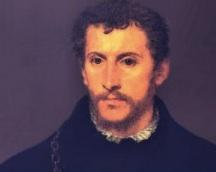St Edmund Campion and St Charles de Foucauld

St Edmund Campion
Jesuit priest and martyr. Born around 1540, Edmund Campion was the son of a London bookseller and educated at Christ's hospital. He won a scholarship to St John's College Oxford in 1557, where he was a brilliant and popular student. When Queen Elizabeth I visited Oxford in 1566 he was chosen by the university as orator to welcome her.
Edmund was ordained as an Anglican deacon in 1569, but openly expressed his uncertainty about his religious beliefs. After a spell in Ireland where he helped found a university (later Trinity College) and wrote a history of the country, he returned to England in 1571 and then went to France to go to the English College in Douai where he professed his Catholic faith and was ordained subdeacon.
He left for Rome later that year to join the Jesuits. After his novitiate at Brunn, he taught at the Jesuit College in Prague. He was ordained priest there in 1578. In 1580 Edmund and another priest, Robert Persons, were chosen to start a mission in England. On his journey he visited Charles Borromeo in Milan. He arrived at Dover disguised as a jewel merchant.
Edmund first ministered to Catholic prisoners and wrote a document in which he challenged the Privy Council, describing his mission as 'one of free cost to preach the Gospels, minister the Sacraments, instruct the simple, reform sinners, to refute errors, in brief to cry alarm spiritual against foul vice and proud ignorance, wherewith many of my dear countrymen are abused.'
His attractive personality, courage, eloquence and learning gave new heart to Catholics struggling to keep their faith in England. But his charismatic preaching was something the authorities could not ignore.
Often in disguise, Campion travelled throughout Lancashire, Yorkshire and the Midlands, preaching, celebrating Mass and administering the Sacraments. He wrote a pamphlet openly challenging Protestants to debate with him. At a service at St Mary's Church in Oxford, 400 copies were secretly distributed.
Campion was finally arrested in Lyford Grange in Berkshire. He was taken to the Tower of London and tortured, but refused to give up his faith. On 14 November he was indicted with others in Westminster Hall on the fabricated charge of trying to incite a rebellion. In spite of his able defence, the jury found him guilty of treason and he was condemned to death.
When Campion heard the sentence he said: "In condemning us, you condemn all your own ancestors, all the ancient bishops and kings, all that was once the glory of England."
Campion stressed his loyalty to the Queen. His only offence was his religion.
With Alexander Briant and Ralph Sherwin he was hung drawn and quartered at Tyburn on this day in 1581.
It has been said that when he died, the Elizabethan age lost one of its most brilliant thinkers and writers.
Edmund Campion was canonised as one of the 40 martyrs of England and Wales in 1970.
St Charles de Foucauld
Born in 1858, to a French aristocratic family, Charles was left an orphan by the age of six, and he and his sister were brought up by their grandfather. As a teenager Charles drfited away from church, and after his grandfather's death in 1878 is said to have led a wild life for a while. It was through a cousin, Marie de Bondy, a deeply spiritual young woman, that he gradually rediscovered his religion. Charles said: "The moment I realized that God existed, I knew I could not do otherwise than to live for him alone."
For a time after his return to the sacraments, Charles lived as a Trappist monk. Although he is remembered as an exemplary religious, the conviction grew that this was not his vocation. After being released from his temporary vows, Charles went to the Holy Land where he became a servant for the Poor Clare nuns. Mother Elizabeth, the Superior of these Clarist sisters encouraged him to consider becoming a priest. Charles finished his studies for the priesthood and was ordained in 1901. Later that year, he left for Algeria to take up the life of a hermit in the desert.
Little Brother Charles of Jesus, as he called himself, thought up and wrote down a plan for two religious orders. The members of these orders would live a life patterned on the life of Jesus at Nazareth. At the time of his death, neither his missionary contacts nor his designs for new religious orders had borne visible fruit. In 1916, living among the fierce Tuaregs of Tamanrasset, Charles de Foucauld was killed by bandits.
Within twenty years after his death, three congregations which derived their inspiration, purpose, and Rules from Charles de Foucauld were formed. The Little Brothers of Jesus, Little Sisters of the Sacred Heart, and Little Sisters of Jesus live in small groups all over the world, preaching by the lives they lead. Two other Orders, founded later, also trace their heritage to Little Brother Charles of Jesus. Charles de Foucauld was declared Venerable on April 13, 1978. He was beatified by Cardinal José Saraiva Martins on 13 November 2005, on behalf of Pope Benedict XVI.
On December 13, 2020, Pope Francis canonized Charles de Foucauld, recognizing his exemplary life of holiness, devotion, and selfless service. Charles de Foucauld is considered to be one of the pioneers of interreligious dialogue.
Read more about St Charles de Foucauld here: https://charlesdefoucauld.info/












